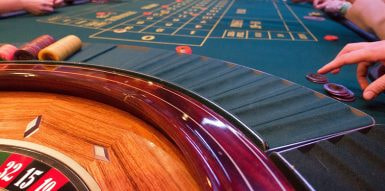Founded in 2009 by Parag Vora, HG Vora Capital Management is a hedge fund and investment adviser focused on value and event-driven investments. For those who might be somewhat unclear on the topic of investments and finance, a hedge fund is an investment fund that pools capital from accredited individuals or institutional investors and invests in a variety of assets often with complex portfolio-construction and risk-management techniques.
Caesars’ CEO – Mark Frissora
Frissora was appointed as CEO to Caesars in 2015 by private equity firms and Caesars’ largest minority shareholders, Apollo Global Management and TPG Capital. An industry source indicated that the latter two firms saw Frissora as a good cost manager as they struggled to find someone who would fill the post. However, his lack of gaming experience surprised many of the other hedge fund entities that took direct control of the casino company a year later.
The history of the participation of HG Vora in Caesars has a long background, as well as the history of the hedge fund company itself. Frissora was previously the CEO of Hertz Holdings for seven years and stepped down in 2014 after the company reported accounting errors. Sources further indicate that a lack of firm support for Frissora by some institutional investors is keeping them from buying Caesars’ shares, keeping the stock price down. Frissora’s contract expires in February 2019. He earned $29 million in total compensation during 2017.
Neither HG Vora nor Caesars has publicly commented on the latter’s intentions to sell Caesars’ assets. However, news of the possible divestitures or outright sale triggered shares to rise with 4.4% in after-hours trading in New York. It remains to be seen whether the HG Vora hedge fund will be able to convince Caesars to sell its assets, thereby raising the share price and providing a source of funding with which Caesars could address its debt.
Emerging from Bankruptcy
 Caesars Entertainment Corp, which owns Caesars, Harrah’s and the Horseshoe brands, emerged from bankruptcy in 2017, after failing to cope with debt amounting to $35 billion. Sources indicate that the debt was the legacy of a leveraged buyout in 2008 led by private equity firms, Apollo Global Management LLC and TPG Global.
Caesars Entertainment Corp, which owns Caesars, Harrah’s and the Horseshoe brands, emerged from bankruptcy in 2017, after failing to cope with debt amounting to $35 billion. Sources indicate that the debt was the legacy of a leveraged buyout in 2008 led by private equity firms, Apollo Global Management LLC and TPG Global.
Caesars is slowly trying to recover from its bankruptcy as it gradually pays its debts and improves profitability which is, more or less, thanks to its creditors. It has also been investing in its US sports-betting business and is exploring ways to expand in emerging markets, seeing that it has no presence in Macau.
The Debt Restructuring Process
In hindsight, a lot of events happened to lead to this point. Let’s look at some of them now. During 2016, for example, in the debt-restructuring scheme, Caesars received an offer by Leon Black to restructure the company’s debt. Black decided to use some of his group’s payout to quell the existing creditors, but Paul Singer’s Elliott Management, a first-lien creditor, objected to this offer.
To address the debt to second-lien creditors, Caesars Entertainment Corp. made an offer of $1.6 billion, enough to pay them 67 cents on the dollar and remove the legal roadblock placed between the casino operator and its restructuring. However, $300 million of the $1.6 million would come from Singer’s group of creditors. If a deal wasn’t reached, lawsuits against Caesars could have proceeded and forced the casino’s two non-bankrupt units into Chapter 11 proceedings, too. Chapter 11 is the code in US legislation related to filing for bankruptcy. Black’s Apollo Global Management and Caesars’ co-owner, TPG Capital, aren’t contributing any new money to the new restructuring plan.
Two months later, and after a year of not yielding to their creditors, Apollo and TPG paid out more cash as part of Caesars’ Chapter 11 re-organisation plan. This gave bondholders an equity stake in the casino’s non-bankrupt units, meaning that investors in the hedge fund would see their return on investment cut to about 27 cents to the dollar.
Apollo and TPG invested a total of $80 million in Caesars. On the other hand, fund investors including New York, New York City, and California pensions invested $3.4 billion in the Caesars purchase.
It was believed that Apollo and TPG planned to combine the bankrupt and non-bankrupt Caesars units after the Chapter 11 proceedings leaving investors with a 10% stake. However, this was not to be as the two non-bankrupt units would later be joined into a single entity.
Caesars Reaching a Deal with All Creditors
 In late September of 2016, Caesars Entertainment Corp finally reached a deal with all its creditors to restructure its debt and emerge from Chapter 11 proceedings. Once a deal was reached, the deal saw the non-bankrupt parts of Caesars combined into a single new company. Initially, a large payout was proposed but this was rejected by Paul Singer’s Elliott Management, which held the first-lien debt into the company.
In late September of 2016, Caesars Entertainment Corp finally reached a deal with all its creditors to restructure its debt and emerge from Chapter 11 proceedings. Once a deal was reached, the deal saw the non-bankrupt parts of Caesars combined into a single new company. Initially, a large payout was proposed but this was rejected by Paul Singer’s Elliott Management, which held the first-lien debt into the company.
The reason for this was that Caesars’ two non-bankrupt units would have been forced into bankruptcy, too. Singer objected to the restructuring plan because Caesars planned to pay creditors with $300 million taken from a kitty to be used to pay first-lien creditors, including Elliott Management. However, the kitty was left alone by Black’s Apollo, which owns Caesars, in order to solidify the blanket deal.
It is clear that Caesars has been in a lot of trouble and that the debt restructuring process was long, tedious, and costly. Payouts to its creditors and the deals reached finally led to a solution that got Caesars out of the red. However, further sales of its assets could have several implications. For example, it would raise revenue for the company, allowing it to address debtors’ demands better as it emerges out of bankruptcy. As evidenced by the rise in share prices, this could see investors keen on HG Vora’s move. However, other minority shareholders haven’t yet expressed an opinion on the issue and the move could be blocked, leaving Caesars with its non-bankrupt assets intact.
Caesars operates 49 casinos in 13 US states in addition to Britain, Egypt, Canada, and South Africa. It has a market capitalization of $7.2 billion and total debt of $9 billion.
HG Vora has about $4 billion in assets under management and has achieved a 14% annualised return since its inception in 2009. The company invested in casino operators, Penn National Gaming Inc and Pinnacle Entertainment Inc, before their merger in 2017. Being LaSalle Hotel Properties’ third-biggest shareholder, HG Vora also backed its sale to Pebblebrook Hotel Trust earlier this year.



